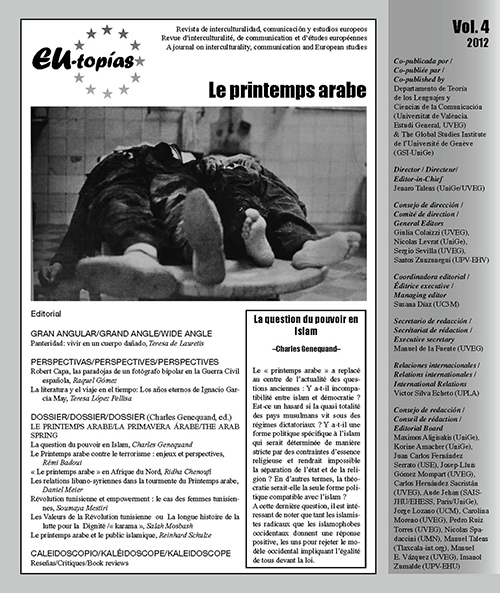Révolution tunisienne et empowerment: le cas des femmes tunisiennes
DOI:
https://doi.org/10.7203/eutopias.0.19773Keywords:
Tunisian women, female revolution, patriarchy, subalternity Abstract
Abstract
Tunisian women have carried out their revolution. Beyond this indisputable fact, a fundamental question does not tire of asking: what if the action of these women were a complete waste of effort? And if what has emerged as a formidable uprising against the subordination and patriarchy was actually a punctual start that the situation after the revolution was quick to temper? The present work aims to analyze the validity of this assumption, not through a trajectory that can be generalized to all women of Tunisia, but a triple path (rural women, women in the country and disadvantaged suburbs, women in civil society and politicians) to allow us to prepare an update of the status of women in this country.
 Downloads
Downloads
 References
References
Blaise, Lilia (2012), « Les femmes démocrates à la croisée des chemins », Réalités, 1367, pp. 16-18.
H. J. (2011) « Les femmes en politique : ‘militantes et légitimes’ », Temps fort, disponible à l’URL http://www.gnet.tn/temps-fort/tunisie/les-femmes-en-politique-militantes-etlegitimes/id-menu-325.html
Mefarej, Leïla (2011), « La représentation féminine après le 14 janvier », disponible à l’URL www.observatoiretunisien.org/pdf/Leila%20BECHA2COR.pdf
Mestiri, Soumaya (2012), « Egalité, complémentarité » Le Maghreb magazine, 12, pp. 66-69.
« La politique au féminin », série d’interviews réalisée auprès des femmes politiques, Le Maghreb magazine, 2, 2011, pp. 54-59
Rapport sur le Monitoring des médias, disponible à l’URL http://femmesdemocrates.org/2012/03/26/medias-monitoring-tunisie-2011-rapport-final/
Yakoubi, Hayet (2012), « Les femmes du bassin minier », Le Maghreb magazine, 10/11, pp. 66-69.
Zbiss, Hanène (2011), « Femmes têtes de liste : qui sont-elles…que veulent-elles ? », Réalités, 1344, pp. 46-49.
Downloads
Published
How to Cite
-
Abstract195
-
PDF (Français )63
Issue
Section
License
![]()
The authors conserve the copyright. All content published in EU-topías. Journal of interculturality, Communication, and European Studies are subject to the license Creative Commons Attribution-NonCommercial-ShareAlike 4.0 license. The full text of the license can be found at <http://creativecommons.org/licenses/by-nc-sa/4.0>
They may be copied, used, disseminated, transmitted and publicly displayed, provided that:
- The authorship and original source of the publication is cited (journal, publisher and URL of the work).
- They are not used for commercial purposes.
- The existence and specifications of this license of use are mentioned.
It is the responsibility of the authors to obtain the necessary permissions for images that are subject to copyright.



